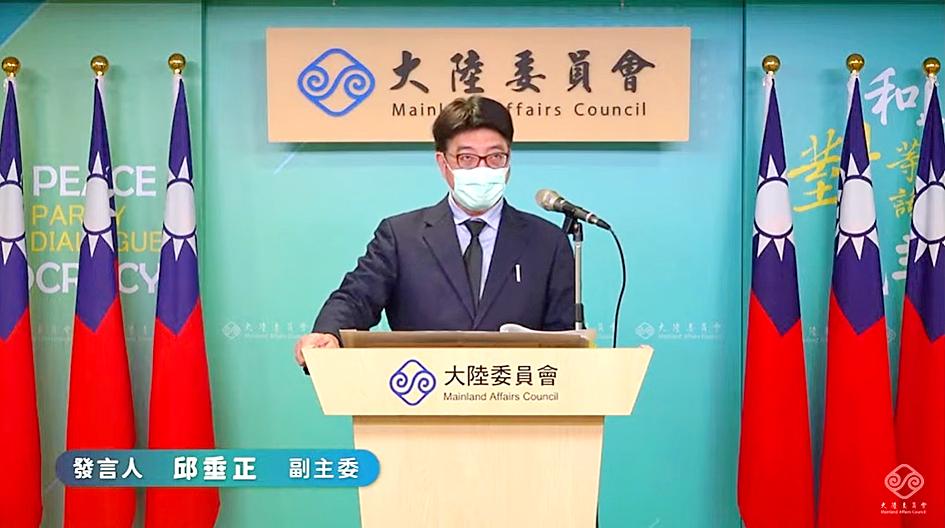A pro-unification pop song aired on Chinese television earlier this month would only further sour Taiwanese sentiment toward China, the Mainland Affairs Council (MAC) said on Wednesday.
The music video for We Sing the Same Song (我們同唱一首歌), which aired on China Central Television, features Chinese artists performing alongside Taiwanese singers Jam Hsiao (蕭敬騰), Ouyang Nana (歐陽娜娜) and Chen Li-nong (陳立農).
The lyrics were reportedly written by Taiwanese lyricist Vincent Fang (方文山), known for his collaborations with Jay Chou (周杰倫), to music composed by a Chinese musician.

Photo: Screen shot from the MAC’s online broadcast
Sung in Chinese and Hoklo (commonly known as Taiwanese), the song is about three Taiwanese siblings who go to China after their grandfather’s death to reunite with their family in China’s Fujian Province.
The sentimental music video features images of the singers intercut with a family sharing a meal, and an interlude showing Matsu (媽祖) statues on China’s Meizhou Island (湄洲島) and Yunlin County’s Beigang (北港) “gazing at each other across the Strait.”
China’s Taiwan Affairs Office said that the song was a coproduction between Cross-Strait Radio and the Taiwan Strait Watch media platform, both of which are part of the state broadcasting conglomerate China Media Group.
Artists on both sides of the Taiwan Strait “put their heart and soul” into creating this “Lunar New Year gift,” office spokeswoman Zhu Fenglian (朱鳳蓮) said on Wednesday.
The song fully demonstrates the homesickness felt by “Taiwanese compatriots,” she said, adding that the two sides “have always been one family.”
Responding to immense backlash to the song in Taiwan, Zhu said that “any lies, malicious incitement or provocations pale in comparison to feelings of affection and unity across the Strait.”
In Taipei, the MAC reiterated that the Republic of China is a sovereign nation that has never been part of the People’s Republic of China.
The Chinese Communist Party has long used shared history and culture to impose its idea of “one China,” turning purely artistic endeavors into propaganda tools, it said.
Pro-unification songs such as this would not only fail to win the approval of Taiwanese, but would actually increase antipathy toward China, it added.
Saying that Taiwanese society respects and upholds artistic freedom, the council urged Taiwanese to cherish their hard-won democracy and reject Chinese propaganda.
MAC spokesman Chiu Chui-cheng (邱垂正) yesterday called on Chinese propagandists to reconsider their strategy.
Rather than telling artists to produce “politically correct” propaganda, it should stop clamping down on artistic thought, respect freedom of expression and allow people to realize their creative potential, Chiu said.
Cross-strait exchanges should be approached rationally and pragmatically to reflect people’s voices and encourage positive development, he added.
Asked whether it was appropriate for Taiwanese artists to participate in the production, Chiu said that he “trusts that Taiwanese society has made its own evaluation.”
He added that there are regulations that must be followed when collaborating across the Strait, and those living or doing business in China must still abide by Taiwanese law.

A preclearance service to facilitate entry for people traveling to select airports in Japan would be available from Thursday next week to Feb. 25 at Taiwan Taoyuan International Airport, Taoyuan International Airport Corp (TIAC) said on Tuesday. The service was first made available to Taiwanese travelers throughout the winter vacation of 2024 and during the Lunar New Year holiday. In addition to flights to the Japanese cities of Hakodate, Asahikawa, Akita, Sendai, Niigata, Okayama, Takamatsu, Kumamoto and Kagoshima, the service would be available to travelers to Kobe and Oita. The service can be accessed by passengers of 15 flight routes operated by

MORE FALL: An investigation into one of Xi’s key cronies, part of a broader ‘anti-corruption’ drive, indicates that he might have a deep distrust in the military, an expert said China’s latest military purge underscores systemic risks in its shift from collective leadership to sole rule under Chinese President Xi Jinping (習近平), and could disrupt its chain of command and military capabilities, a national security official said yesterday. If decisionmaking within the Chinese Communist Party has become “irrational” under one-man rule, the Taiwan Strait and the regional situation must be approached with extreme caution, given unforeseen risks, they added. The anonymous official made the remarks as China’s Central Military Commission Vice Chairman Zhang Youxia (張又俠) and Joint Staff Department Chief of Staff Liu Zhenli (劉振立) were reportedly being investigated for suspected “serious

ENHANCING EFFICIENCY: The apron can accommodate 16 airplanes overnight at Taoyuan airport while work on the third runway continues, the transport minister said A new temporary overnight parking apron at Taiwan Taoyuan International Airport is to start operating on Friday next week to boost operational efficiency while the third runway is being constructed, the Ministry of Transportation and Communications said yesterday. The apron — one of the crucial projects in the construction of the third runway — can accommodate 16 aircraft overnight at the nation’s largest international airport, Minister of Transportation and Communications Chen Shih-kai (陳世凱) told reporters while inspecting the new facility yesterday morning. Aside from providing the airport operator with greater flexibility in aircraft parking during the third runway construction,

American climber Alex Honnold is to attempt a free climb of Taipei 101 today at 9am, with traffic closures around the skyscraper. To accommodate the climb attempt and filming, the Taipei Department of Transportation said traffic controls would be enforced around the Taipei 101 area. If weather conditions delay the climb, the restrictions would be pushed back to tomorrow. Traffic controls would be in place today from 7am to 11am around the Taipei 101 area, the department said. Songzhi Road would be fully closed in both directions between Songlian Road and Xinyi Road Sec 5, it said, adding that bidirectional traffic controls would